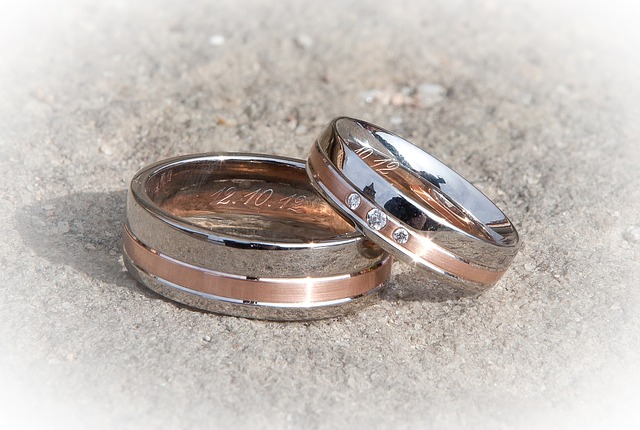Quick guide: How to Pick the Perfect Matching Wedding Bands
When you have found your perfect match, the best way to show this off to the world is, of course, with an equally perfect set of matching wedding bands! Because two people finding each other and falling in love amidst the millions of other people on the planet is truly a magical thing. It goes without saying that the rings you exchange on your wedding day should be extra special, too.
Finding the perfect pair to symbolize your happy union is no simple task. Although it can be pretty convenient to simply visit your nearest jewelry shop and pick out what you like, it would be best to actually sit down and carefully consider several factors before deciding on a purchase.
The top three things to take into account are your budget, your lifestyle, and your individual personalities.
Define Your Budget
- What is your budget? Do you have a high one or are you looking for something more affordable? It is very important to set your budget before heading to the jeweler's store to buy your wedding bands. With this, you can safely shop within your budget limits.
- Knowing your budget can discourage you from overspending. After all, we cannot argue the fact that weddings are expensive! Budgeting for your wedding bands should definitely be a part of your wedding planning. What you can do is state your budget limits to the jeweler, and they can show you a selection that matches your budget preferences. This also lets you avoid any accidental overspending (and the pangs of regret that often come with wanting something you can't have!)
- Do not be afraid to discuss things with your jeweler! If you tell them how much you are willing to pay upfront, they should be able to give you advice on which metals, gemstones, and designs can be accommodated by your budget. For instance, if your budget is high enough, you might be able to score platinum bands with a few small diamonds in a pave setting. If it's mid-range, you could opt for the most popular option—gold—and perhaps a single diamond embellishment.
- If you're on a tight budget, then plain stainless steel bands might be the way to go. Lastly, don’t forget to consider your engagement ring when choosing your wedding bands! Find a pair that closely matches your engagement ring in some way, be it in the style or the type of metal.
Quick tip: If you are on a tight budget, consider getting a wedding set. This includes matching wedding bands for the bride and groom, as well as the engagement ring. Going for a wedding set would save you time and effort in picking out separate matching bands. The engagement ring is also designed to fit perfectly with the wedding band when worn together on the bride's finger, and you won't have to worry about mismatched diamond proportions.
In addition, it is much more affordable because you are paying a package price for the whole set, as opposed to buying three individual rings, making it a practical choice for budget-conscious couples. However, the couple will have to buy the wedding set together, taking away the element of surprise that makes engagement ring proposals so heartwarming and emotional. (The groom could propose without a ring, which might be unheard of for some, but many practical couples actually don't mind! In fact, some women prefer it this way because it allows them to choose their own diamond engagement rings.)
Check Your Lifestyle
What kind of lifestyle do you lead? Are you active individuals who love sports? Do you often work with your hands?
Your lifestyle will have an impact on what type of metals and designs will work best for your wedding bands. Some metals are more durable than others and can withstand the wear and tear of active sports. For example, platinum or titanium are good durable metals and will be a good fit for active individuals.
Tungsten carbide may be recommended for you if you work heavily with your hands. Silver would not be advisable because it is easily scratched and tarnished, and wears faster than other metals.
Intricate bands with filigrees may be okay for office employees with desk jobs, but not recommended for hands-on workers, such as artists or persons in the medical field, because it can get caught on cloth or other materials due to its non-solid design.
This is where talking to your jeweler is the best way to go, especially if you and your partner have different jobs or professions. Your jeweler can help you find that perfect balance of metal and design for your matching wedding bands.
Personality Matters
Your personality and sense of style will no doubt influence your wedding band preferences. Are you of the type who loves to personalize their jewelry? Maybe a custom engraving will be to your liking then.
Do you prefer clean-cut designs? Then the classic, solid band is for you. Perhaps you're more into one-of-a-kind designs or custom styles? Consider filigree wedding bands with intricate Celtic knots and loops.
Do you and your partner like the same things or do you have different style preferences? What if you love the romantic hue of rose gold, but he prefers the sleek sheen of platinum or the slate gray coolness of tungsten or titanium? The solution might be two-tone or tricolor matching wedding bands that incorporate both of your styles.
These are a few things you may need to think about when choosing your wedding bands. Your answers to these questions can help you determine the design that fits both of your personalities (with the help of your jeweler, of course!)
A Quick Breakdown of Metals
Since we have been talking about metals quite a bit, here is a quick overview of the most popular metals used in wedding bands:
GOLD
Gold is the classic go-to metal of choice for most couples. Because pure gold is too soft to make into jewelry, it is often alloyed with other metals to make it stronger. Yellow gold typically contains zinc or copper alloys, while white gold has a mix of silver or palladium. The popular rose gold is also due to the presence of copper. However, gold is less durable than other metals. It has low scratch resistance and can tarnish over time. White gold, in particular, yellows with age and often needs rhodium plating to maintain its silvery sheen. In addition, some people are allergic to the alloys used in gold jewelry.
PLATINUM
Platinum is one of the most valuable metals in existence. It is very popular despite the steep price point because of its high durability. It is also hypoallergenic. A platinum wedding band would be the “ultimate” aspiration of many engaged couples.
SILVER
Silver is one of the more affordable alternatives, and its white color and shine makes it appealing to many. However, it requires more maintenance than other metals because it can easily get scratched, and thus often reserved for very special occasions. If you do not plan to wear your wedding band every day, then silver is still a viable option for you.
PALLADIUM
Palladium is a white metal that hails from the platinum family. It has become a favorite alternative to platinum because it is less expensive and also lighter in terms of density. Just like platinum, it is hypoallergenic and does not tarnish. However, it is less available than platinum.
TITANIUM
Although not a precious metal, titanium is fast gaining popularity because of its high durability and low price point. It is also a very lightweight metal, which makes it comfortable to wear, and hypoallergenic to boot. It is very low-maintenance, so you never have to worry about regular cleaning or visits to the jeweler. Its dark gray color is also an alluring alternative to the typical white metals.
TUNGSTEN
Tungsten is originally an industry metal that has made its way into the jewelry space. It is another strong and highly durable metal that does not tarnish. Being a very hard metal, it is also quite heavy. You will definitely feel the weight of this band on your finger.
STAINLESS STEEL
Another industry metal that has been welcomed in jewelry making, stainless steel is likely your most affordable option among all the wedding band metals. Although not as common as those that are already established, it is earning a following due its relatively low maintenance, durability, and sleek finish. It is hypoallergenic but not entirely scratch-resistant, but for some couples, the budget-friendly price point may more than make up for some wear and tear.
Marriage is a sacred bond and a significant step towards your future together. Your wedding bands should be considered a physical representation of the vows you exchange, and ideally should last a lifetime. This is not to say that you absolutely must go above and beyond to acquire a truly exceptional set, but addressing some of the factors like those mentioned above early on can help you find the perfect matching wedding bands that suit your budget, lifestyles, and personalities.







Comments
Post a Comment